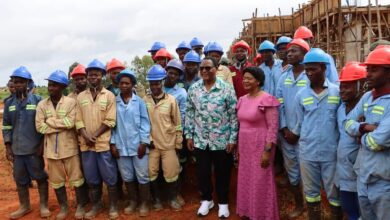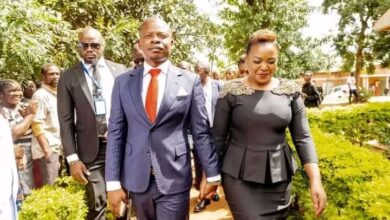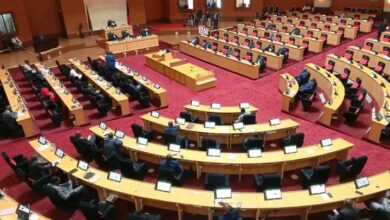News
Mtambo delivers lecture at University of Pretoria – tackles role of civil society in Political Coalitions
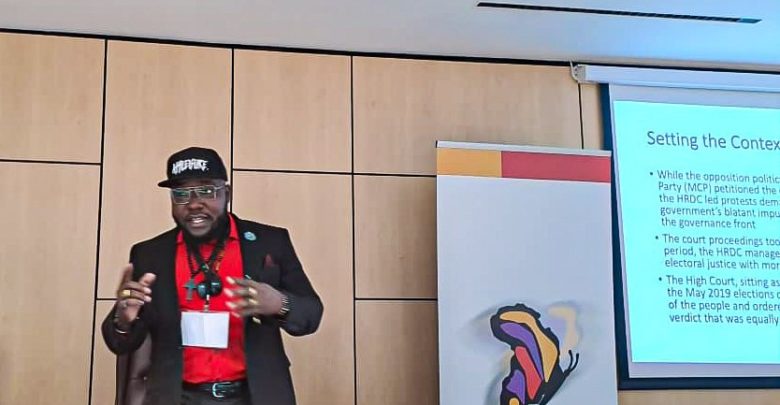
By Durell Namasani
The Former Minister of National Unity Timothy Mtambo who remains an icon and face of the struggle that toppled the corrupt DPP regime out of power recently took time to give a lecture at the invitation of University of Pretoria’s Centre for Human Rights in South Africa. The lecture was part of Human Rights Defenders in Leadership and Learning. Mtambo’s , lecture relieved of the days of his activism and being at the centre of fighting a regime that was eager to supress the freedom of Malawians by its insistence on promoting Corruption, nepotism , disregard of rule of law , militarization of the police and blatant abuse of human rights especially for people living with albinism
Mtambo lecture entitled “Learning from Malawi’s Human Rights Defenders Coalitions (HRDC) experience” opened up with a brief background of the political transformation that has happened in Malawi over the past few years . “When the May 2019 elections were held and the incumbent governing party –the Democratic Progressive Party (DPP) – declared victorious, this triggered instant national wide protests led by the HRDC following revelations that the results of the elections were marred by massive irregularities such that they were not a genuine reflection of the will of the people” opened up Mtambo.
He went on to narrate of the events that followed the 2019 elections including opposition political parties – UTM and the Malawi Congress Party (MCP) petitioning the courts to overturn the results of the elections, the HRDC led protests demanding for electoral justice and an end to the government’s blatant impunity that had more or less become a norm on the governance front. The court ruling to have a rerun of the election In June 2020 which saw the opposition political parties winning the elections with 59% of the votes ejecting the DPP from the helm of government
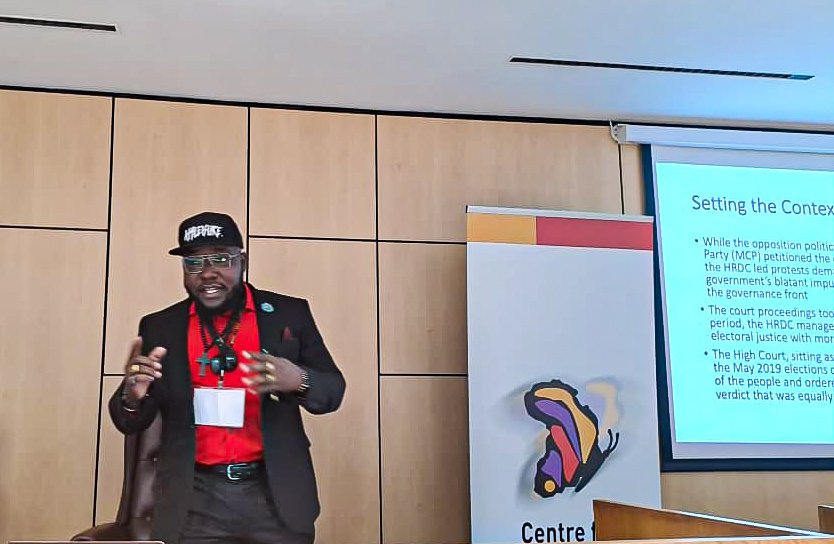
Mtambo’s key question centred on how a civil society organisation like the Human Rights Defenders Coalition (HRDC) of which he was the head at the time manage to mobilize and play a key role in formation of a coalition of opposition parties that ended up winning the election. Mtambo went on to highlight the principles that ensures success in political coalitions . Among the examples he gave to the listening participants was; Long-term coalitions trade breadth for depth and seek to build a narrower agenda that more deeply engage the commitment of their members and leaders; A less is more approach helps to avoid situations in which coalitions end up taking ‘a mile wide and an inch deep’ agenda and tend to only be able to agree on what they are against rather than what they are for
“With less people around the table there is an incentive to do more together, in particular focus on building close, respectful public relationships between individuals involved that explore their personal and organizational interests” argued Mtambo
Mtambo used his practical experience to highlight what he believes are the benefits of Political Parties getting into Coalitions .He said Parties can win on more fronts than a single party working alone can thereby increasing the potential for success. Coalitions Brings in more expertise and resources to bear on complex issues, There is Development of new leaders as experienced group leaders step forward to lead the coalition and openings are created for new leaders in the individual groups. He further highlighted that Coalitions Builds a lasting base for change since once groups unite, each group’s vision of change broadens and it becomes more difficult for opposition groups to disregard the coalition’s efforts as dismissible or as special interests and also the chance to raise its members’ public profiles by broadening the range of groups involved in a conflict and as such activities of a coalition are more likely to receive more media attention than those of any individual organization.
Mtambo was quick to explain that there are still some challenges that can be faced through the process. The challenges include Members getting distracted from other work and when this happens non-coalition efforts may become less effective and the organizations may be weakened overall. A coalition may only be as strong as its weakest link especially since organizations that provide a lot of resources and leadership may get frustrated with other members’ shortcomings. The democratic principle of one group-one vote may not always be acceptable to members with a lot of power and resources hence it is imperative that a coalition must carefully define the relationships between powerful and less powerful groups. Individuals may not get credit for their contributions to a coalition; members that contribute a lot may think they did not receive enough credit.
Mtambo used the opportunity to highlight using empirical evidence how the HRDC managed to play a key role in the formation of the Tonse Alliance that went on to win Malawi elections in 2020. He admitted that No clear cut answer is feasible because the success of the HRDC was a confluence of so many factors – some strategic, some circumstantial, some contingent while others entirely spontaneous. Mtambo argued that people power was at the centre of what HRDC did and that alone is one major factor that can determine the political direction and strategy of any party.
“The HRDC was grounded in the grassroots that made an average Malawian feel sufficiently invested in lasting change; they owned the movement. The agenda or vision was very clear and accessible to an ordinary Malawian; they understood it and backed it all the way. There was sufficient consensus and clarity about the agenda of the movement in terms of what was its end game – installation of a government that works for all irrespective of one’s position in society”
Mtambo believes HRDC cultivated trust among Malawians because the organisation earned a reputation not just as talkers but doers even when the odds were stuck against them. The movement strived to follow the law making it was very difficult for the opponents to dismiss it as simply misguided or for the government to target and deal with the leadership of the movement by abusing its control of the state machinery
Mtambo went further to highlight the catalyst for HRDC Success that also included engaging passionate lawyers to ensure that the its acts were lawful at all times and as such the movement was above reproach. Having Strong leadership characterized by top notch networking and coordination skills. The leadership remained focused and resolute, not entertaining fear, fatigue, mediocrity and betrayal.
Mtambo also spoke on the power of networks and partnerships. He said HRDC benefitted a lot from having good Coordination with the diaspora as Malawians all over the world supported the struggle and thwarted many underhand tactics that the government schemed to frustrate the movement. Strong networks and partnerships with various organizations globally played a huge part in the success ( SAHRDN, Pan African Human Rights Network, Front HRD, Amnesty International, Human Rights Watch, SALC, UN) Mtambo also spoke on how entertainment played a key role in galvanising the youths .
He finished his lecture by summing up that deciding whether or not to join a coalition is both a rational and emotional decision. He said rationally, one must consider whether one’s effectiveness and one’s ability to attain one’s own goals would be enhanced or harmed by participation in a coalition. Emotionally, one must consider whether one likes the other people or groups, and whether cooperating with them would be easy or more trouble than it is worth.
Critically important, organizational styles, cultures, and relationships must be considered well before any choices are made
“But as the case of HRDC in Malawi demonstrates, the success factors are not prescriptive even though they are important clues from theory and in the final analysis Leadership, strategic, visionary and bold Leadershi matters ” he said



